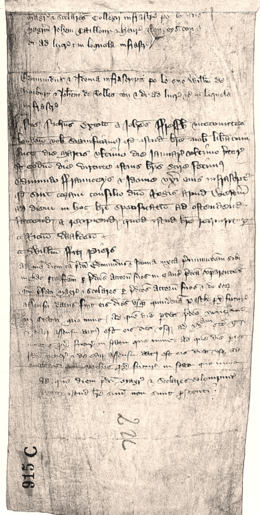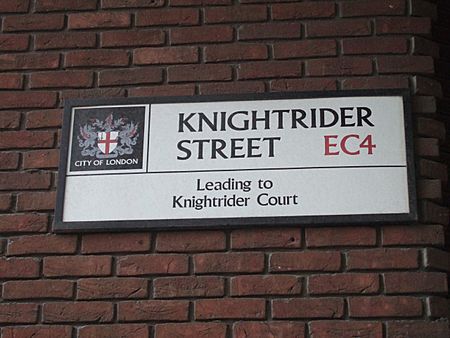John Fresshe facts for kids
Quick facts for kids
National Archives document SC 8/19/915C: In 1385, King Richard II issued this summons to the sheriffs of London, Nicholas Exton and John Fresshe, requesting them to find, apprehend and to bring Edmund Fraunceys and his wife Idonia before the King's council on a charge of attempting to defraud University College, Oxford.
|
John Fresshe (sometimes spelled Frossh or Frosh) was an important citizen of London in the late 1300s. He was an alderman, which is like a city councillor, and even became the Mayor of London.
John Fresshe was a successful merchant, meaning he bought and sold goods for a living. He was part of the Mercers' Company, a powerful group of merchants in medieval London. People at the time thought he was one of London's "leading citizens."
We don't know much about John Fresshe's early life. He first appears in historical records when he got married in 1373. After that, he quickly rose through the ranks in London's government. He became an alderman and served both the city and the King, Richard II.
He faced some challenges, especially around 1381 during the Peasants' Revolt. He was even accused of helping the rebels and was put in prison for a short time. However, his friends soon gained power in the city council, and John Fresshe was back in favor.
John Fresshe was very good at business and made a lot of money. He also helped his friends make money by acting as a broker for them. In 1392, the King was unhappy with how London was being run. He had all the city officials arrested and took away London's right to choose its own mayor. But this didn't stop Fresshe for long. He and his friends were soon released, and in 1394, John Fresshe was elected mayor.
He passed away on September 6, 1397. He was buried in the St Benet Sherehog church, which he had supported for many years. His wife outlived him, and their three daughters married into other important merchant families.
Contents
John Fresshe's Early Life
We don't know much about John Fresshe's childhood. Some historians think he might have been an apprentice to a leading merchant when he was young. This is because he later married the merchant's daughter.
John Fresshe first appears in city records when he married Juliana (also called Gillian) in 1373. Juliana was the daughter of a very important merchant. She brought with her not only a dower (money or property given by the bride's family) but also the right to collect an old debt owed to her father. John Fresshe successfully collected this debt. Even early in his career, he was a wealthy man. He even donated money to a city fund that aimed to bring important lords back to Westminster for a meeting.
John Fresshe's Career
John Fresshe became an alderman for London's Bassishaw Ward on March 12, 1381. Before that, in December 1380, he was chosen to collect King Richard II's unpopular poll tax in the city. This tax actually caused the Peasants' Revolt in June 1381.
Fresshe was one of three men sent by the mayor to meet with the rebel leader Wat Tyler at Blackheath. The mayor wanted them to talk to the rebels and convince them to leave. However, one of Fresshe's colleagues, John Horn, supposedly told the rebels that "the whole city of London felt as they did." This might have encouraged the rebels to enter London. It's not clear how much Fresshe supported Horn's actions. Some later investigations suggested Fresshe did support Horn, while others said he didn't. Fresshe was released on bail and later cleared of any wrongdoing.
Trading and Wealth
John Fresshe became very rich through successful trading. He didn't just trade in mercery (fine fabrics); he also got involved in the profitable wool trade with other countries. For example, in 1385, he was allowed to send a large amount of wool to Calais.
As a mercer, he had many apprentices learning the trade from him. These apprentices, like William Walderne, also worked as his agents in Calais, helping with his wool business. Fresshe also bought and sold goods for his friends and business partners. He even traded expensive cloth worth hundreds of pounds to places like Calais and Portugal.
Fresshe was also careful with his money. He lent money to people but was quick to go to court if he needed to get his loans back. Between 1381 and 1383, he filed nine lawsuits to get back over £90.
Challenges with John Northampton
After the Peasants' Revolt, a new mayor named John Northampton was elected. He was a radical leader who wanted to make big changes. John Fresshe, as a leading merchant, found himself in a political fight with Northampton. Historians say Northampton's election seriously threatened Fresshe's career.
Northampton was temporarily successful in his campaign against the powerful merchant groups. Some aldermen, including Fresshe, were suspected of helping the rebels in 1381. Northampton pushed for them to be tried for treason. Fresshe and four other aldermen were accused of helping the rebels enter London. They were also accused of trying to burn an important city record book.
Northampton and his supporters planned these accusations to weaken the power of the wealthy merchant groups. John Fresshe was put in the Tower of London with his colleagues. This imprisonment meant he couldn't hold a city office for a year. However, Northampton only served one term as mayor. Within a few months, Fresshe and his friends were pardoned when his business partner, Nicholas Brembre, became mayor. After another investigation, all four men were found innocent of all charges.
Later Political Life
John Fresshe's friend, Mayor Brembre, served three terms. During Brembre's second term (1384–85), Fresshe served as a city sheriff. In the same year, Fresshe was part of a group that asked the King to execute Northampton.
After serving as sheriff, Fresshe became an alderman again. In 1385, he was elected alderman for Cordwainer Ward, holding this position until 1394. In 1393, Fresshe was called to attend a parliament meeting at Westminster.
In 1392, King Richard II was very unhappy with London's leaders. He said he found "notable and evident defaults" in how they governed the city. London's right to govern itself was immediately stopped. The King sent his own men to run the city, and Fresshe and other former leaders were called before a special court. Fresshe seemed to get through this difficult time without too much trouble. He even lent the King £200 in 1396.
Personal Life
Before March 1373, John Fresshe married Juliana Plucket. She was the daughter of William Langrich and the widow of another merchant. John and Juliana had three daughters, and all of them made good marriages.
- Their oldest daughter, Christine, married John Squiry, a royal official.
- Another daughter married Walter Newenton, a grocer and alderman who later became a sheriff of London.
- Margaret married Walter Cotton, one of Fresshe's former apprentices. Walter Cotton became very successful, following in Fresshe's footsteps as an alderman and sheriff.
John Fresshe continued to work as a Mercer until his death on September 6, 1397. Historians describe him as "among the wealthiest merchants in London." His will shows just how rich he was. Fresshe left over £600 to his family, friends, and colleagues. His wife received his silver plate, and his eldest daughter received a yearly payment of 50 marks.
He also left money for St Benet Sherehog church, where he wanted to be buried. This money helped pay for a chaplain to say mass for his soul and the souls of his family. John Fresshe had supported this church since at least 1395.
Official Roles and Properties
Besides being a tax collector and alderman, John Fresshe held many other important roles for the city and the King. Only men who had been elected Sheriff could become mayor. So, Fresshe served as Sheriff of London and Middlesex from September 1384 to 1385. In 1384, he was also elected to the common council.
Fresshe was elected Mayor in October 1394 and served for a year. He also held positions outside London. Around 1386, he became the Forester of Waltham Hundred in Essex. This was a position he inherited through his wife. In 1390, the King made him a Constable of the Westminster Staple, a role he held until 1393.
John Fresshe also owned many estates and properties in Essex, which his wife had brought into their marriage. These included land in Barking, Nazeing, North Ockendon, and Cranham. In London, his wife brought him a house in Cordwainer Street. Fresshe also bought more land in Essex, including a watermill and land in Havering-atte-Bower. He became the lord of the manor of Dovores, an area stretching from Havering to Bowers Gifford.



